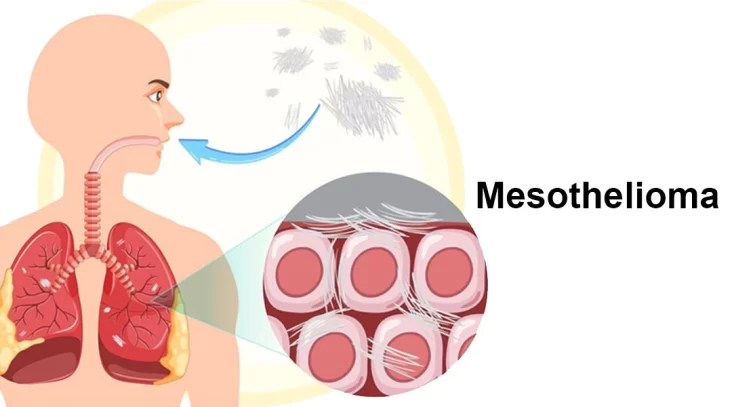Mesothelioma is a rare and aggressive cancer primarily caused by exposure to asbestos fibres. Asbestos, a naturally occurring mineral known for its heat resistance and durability, was widely used in various industries such as construction, shipbuilding, manufacturing, and automotive until its health risks became widely recognized.
The main cause of mesothelioma is inhalation or ingestion of asbestos fibres. When disturbed, asbestos releases microscopic fibres into the air, which can be easily inhaled or ingested by individuals nearby. Once inside the body, these fibres can penetrate the protective lining of internal organs known as the mesothelium, leading to chronic inflammation, cellular damage, and eventually, the development of cancer.
The latency period for mesothelioma—the time between initial asbestos exposure and the onset of symptoms—can be lengthy, often spanning several decades. This long latency period makes diagnosis challenging and often delayed, as symptoms may not manifest until the disease has reached an advanced stage.
The symptoms of mesothelioma
vary depending on the type and stage of the disease. The most common type, pleural mesothelioma, affects the lining of the lungs and typically presents with symptoms such as:
- Chest pain: Patients may experience persistent or sharp chest pain, often localized to the affected side.
- Difficulty breathing (dyspnea): As the tumour grows and spreads, it can obstruct the lungs, causing breathing difficulties.
- Persistent cough: Patients may develop a chronic cough, which may be accompanied by coughing up blood (hemoptysis).
- Unexplained weight loss: Mesothelioma can cause appetite loss and unintentional weight loss, often due to the body’s metabolic changes in response to cancer.
Peritoneal mesothelioma, which affects the lining of the abdomen, may present with symptoms such as:
- Abdominal pain: Patients may experience persistent or sharp abdominal pain, which can worsen over time.
- Abdominal swelling (ascites): Fluid buildup in the abdomen can lead to swelling, discomfort, and a feeling of fullness.
- Changes in bowel habits: Mesothelioma can cause constipation, diarrhoea, or other changes in bowel movements.
- Nausea and vomiting: Patients may experience nausea and vomiting, particularly if the cancer affects the digestive system.
Pericardial mesothelioma, though rare, affects the lining of the heart and may present with symptoms such as:
- Chest pain: Patients may experience chest pain or discomfort, often localized to the centre of the chest.
- Irregular heartbeat (arrhythmia): As the tumour affects the heart’s function, patients may experience palpitations or irregular heart rhythms.
- Difficulty breathing (dyspnea): Pericardial mesothelioma can compress the heart and interfere with its ability to pump blood effectively, leading to shortness of breath.
Diagnosing mesothelioma typically involves a combination of imaging tests such as X-rays, CT scans, and MRIs, as well as biopsies to confirm the presence of cancerous cells. A thorough medical history, including potential asbestos exposure, is crucial for an accurate diagnosis.
In conclusion, mesothelioma is primarily caused by exposure to asbestos fibres, with symptoms varying depending on the type and stage of the disease. Early detection and intervention are essential for improving outcomes and quality of life for patients. Understanding the causes and symptoms of mesothelioma can help individuals recognize potential risks and seek appropriate medical care if needed.

